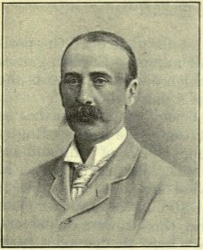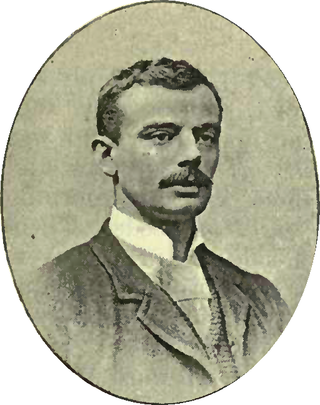Related Research Articles
Welburn is a village and civil parish in North Yorkshire, in England, 2 miles south-west of Kirkbymoorside and about 24 miles from York. The population of the parish was estimated at 60 in 2012. As the population of the civil parish was less than 100 it was not separately counted in the 2011 census and was included with the civil parish of Wombleton.

Darlington RFC are a rugby union team that are situated in the North East town of Darlington, County Durham. They play at Blackwell Meadows on the south side of the town running parallel to the town's A66 by-pass. The first XV plays in Counties 1 Durham & Northumberland.

Sir Frederick Acclom Milbank, 1st Baronet, was a British Liberal Member of Parliament.
Reginald Halsey Birkett was an English footballer who played for Clapham Rovers, as well as the England national side. He also played international rugby union for England in 1871, in the first international rugby match. In this match he scored England's first try.
Edward O'Donovan Crean was an English rugby union player who was part of the first official British & Irish Lions team that toured South Africa in 1910. He is one of a small number of Lions players to have never played for their national side.

Frederick Stokes was the first captain of the England national rugby union team, who played for and captained the team in the first three rugby internationals, all between England and Scotland. He was also the youngest president of the Rugby Football Union.
Counties 1 Durham & Northumberland, formerly known as Durham/Northumberland 1 is an English amateur rugby union competition. The league consists of twelve clubs, and is the seventh tier of the English rugby union system, as one of the 16 regional leagues, though is the highest level of local rugby in the North East of England. The champions are automatically promoted to North 1 East, a division with a wider geographical area that also encompasses the Yorkshire region. The runners-up participate in a play-off against the runners-up from the equivalent regional league, Counties 1 Yorkshire, for promotion. The bottom two are relegated to Counties 2 Durham & Northumberland.

Fernand "Fred" Bonsor (1862-1932) was a rugby union international who represented England from 1886 to 1889, he also captained his country. At club level he played for Bradford FC, and Skipton RFC.

Dawson Turner was a rugby union international who represented England from 1871 to 1875.

Henry John Cecil Turner was a rugby union international who represented England in 1871 in the first international match.
Percival Wilkinson was a rugby union international who represented England in 1872 against Scotland in his only appearance for the national side.
Edward Forbes Walker was a rugby union international who represented Great Britain on the 1903 tour to South Africa. He represented Great Britain twice but never won a cap for his national side, England.
Andrew Bulteel (1850–1888) was a rugby union international who represented England in 1875.

John Edmund Bentley was an English sportsman who played in the first international rugby football match in 1871, representing England as a halfback.
Joseph Thomas Haslam was an English rugby union threequarter and fullback who played club rugby for Batley, Dukinfield and Stockport RFC. Tom represented Yorkshire and Cheshire at county level. Tom a member of the British Isles team who in 1888 toured New Zealand and Australia tour, the first British overseas tour.
Herbert John McFerran (1900–1996) was an English footballer who played as a centre forward in the Football League for Darlington. He was also on Durham City's books but never played League football for them.
Jack Clowes, was an American-born British rugby union footballer of the 1880s, who played in Yorkshire for Halifax, and was selected to play at a representative level for the British Isles on the 1888 British Lions tour to New Zealand and Australia, the first tour by a team representing the British Isles. Clowes is notable for having been prohibited from playing on that 1888 tour due to the Rugby Football Union deeming him a professional, and for the subsequent ramifications of his case contributing to the creation of the Northern Rugby Football Union in 1895.
The Durham County Rugby Football Union is the governing body for the sport of rugby union in the historic county of Durham in England. The union is the constituent body of the Rugby Football Union (RFU) for Durham County, it administers and organises rugby union clubs, competitions and Durham county rugby representative teams.
Louis Birkett was an English rugby union player who played for Clapham Rovers and was also selected to play for England. He was the younger brother of Reg Birkett and uncle of John Birkett.
James Genth (1849–1926) was a rugby union international who represented England from 1874 to 1875.
References
- 1 2 3 4 5 6 Lions rugby official site – profile of Herbert Brooks
- 1 2 Census Returns of England and Wales, 1871, Class: RG10; Piece: 4883; Folio: 50; Page: 33; GSU roll: 848002
- ↑ 1861 England Census, Class: RG 9; Piece: 3249; Folio: 18; Page: 30; GSU roll: 850880
- ↑ Durham County Council Darlington, Milbank Road, Cleveland College
- ↑ "The English team". Otago Witness. paperspast.natlib.govt.nz. 27 April 1888. Retrieved 20 June 2017.
- ↑ 1891 England Census, Class: RG12; Piece: 3215; Folio: 135; Page: 37; GSU roll: 6098325
- ↑ 1901 England Census, Class: RG13; Piece: 3837; Folio: 23; Page: 10